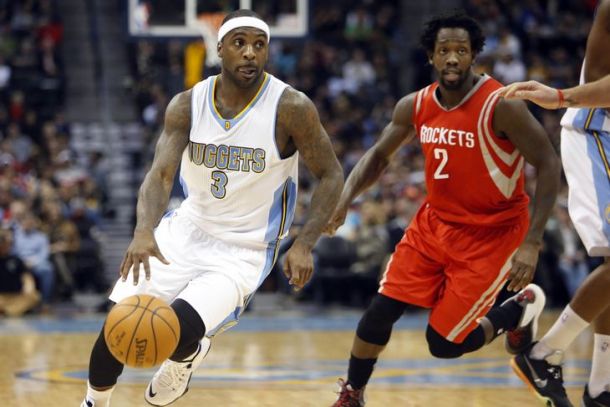The Houston Rockets have built a winning foundation over the last three years by making enormous splashes during free agency. It all started in 2012 when they acquired James Harden from the Oklahoma City Thunder and made him the cornerstone player while adding complimentary pieces in Jeremy Lin and Omer Asik.
In 2013, the Rockets were able to pry Dwight Howard away from the Los Angeles Lakers to create a dynamic duo with him and Harden. In 2014, they lost Chandler Parsons but quickly replaced him with Trevor Ariza who fit right in with Harden and Howard. It’s 2015, and Daryl Morey and the Rockets continue to win big in free agency.
They have acquired Denver Nuggets’ troubled point guard Ty Lawson in exchange for Kostas Papanikolou, Nick Johnson, Pablo Prigioni, Joey Dorsey, and a protected first-round draft pick. Basically the Rockets attained an All-Star caliber point guard for third string players and a future pick, creating a monstrous starting unit. Just when we thought the Texas teams couldn’t get any better, the Rockets pull off this move to counter the San Antonio Spurs’ signing of LaMarcus Aldridge and David West.
No question the Rockets look good on paper with a starting five consisting of Lawson, Harden, Ariza, either Donatas Motiejunas or Terrence Jones, and Howard. Pair that group with a relatively better bench unit, and the Rockets are seemingly championship contenders.
But as we know, talent isn’t everything in the NBA. If it was, the 2004 and 2013 Laker teams wouldn’t crumble like they did. The 2014 Brooklyn Nets wouldn’t have lost in the second round of the playoffs in an inferior Eastern Conference. Last year’s Dallas Mavericks squad had a promising starting unit as well, but they deteriorated late in the season and in the playoffs.
The 2015 Mavs are the latest and greatest example of too much talent but poor fit. When Dallas acquired Rajon Rondo from the Boston Celtics, many assumed they would become immediate contenders. But when the season finished, they seeded seventh and lost in five games to the Rockets in the postseason.
What went wrong? Rondo’s ego and inability to listen to coach Rick Carlisle was definitely one problem. Another was the point guard’s inability to mesh with backcourt mate Monta Ellis. Rondo came from a team where he was accustomed to running the offense and dominating the ball. When he arrived in Dallas, his freedom to control the pace and dictate the offense was taken away because Ellis was also another ball handler who demanded the orange.
James Harden, the leader in assists amongst shooting guards the last two seasons, has been the one running the offense for Houston throughout his three-year tenure with the team. He’s always played with point guards who haven’t needed the ball to be effective. Since Lin was turnover prone and more of a scorer, Harden was handed with play making responsibilities. After Lin was benched and later moved to Los Angeles, Patrick Beverley became Harden’s backcourt mate.
Beverley, however, is yet another point guard who hasn’t needed the ball to make an impact. He is mainly known for his defense, hustle, and spot up shooting. But Lawson is a completely different player, one who is comfortable running offenses, ball handling, and setting up teammates with quick penetration or the pick and roll.
Having another play maker in the backcourt may create a problem for Harden and the Rockets. Unlike Beverley and Lin, Lawson is most effective with the ball in his hands. Most of his points come on dribble drives or off the pick and roll. Adjusting his game to become a spot up shooter may seem difficult for Lawson. It’s not that he is a poor three-point shooter (he has averaged 36.9% from deep in his career), but he is simply not an off-the-ball scorer.
Maybe Lawson does ultimately find his niche as an off ball player, but it will take a lot of losing, frustration, and time. Whatever happens, Lawson will have to become comfortable not bringing up the ball at all times. His assists numbers are bound to drop and his role will undoubtedly change.
Lawson finished third in assists last season, averaging 9.6 per game, which was also a team-high. The second highest assist man on Denver’s roster was Jameer Nelson, averaging 3.7 assists. That just shows how much the Nuggets depended on Lawson to assemble their offense. He will not have that responsibility in Houston but is he willing to accept that and, most importantly, is he willing to adjust his game?
Of course, aside from fit and chemistry, Lawson has to deal with his off court issues. That is another concern for the Rockets. Can a winning environment keep Lawson focused on basketball? That remains to be seen.
It’s always good to have maximum talent on a team, but it’s better to have pieces that fit together like a jigsaw puzzle.










































